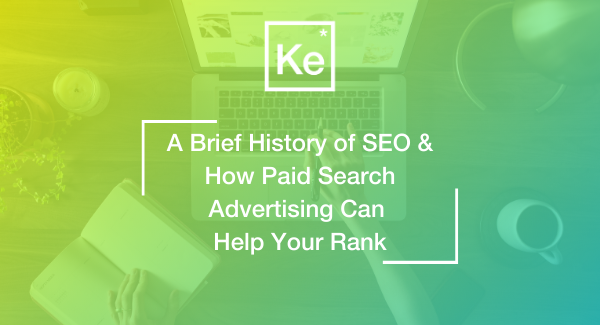Since the beginning, search engines have wanted to guide users to the most relevant content available. Typically, they did this by matching a search term to words within a web page. People abused this system by using a technique called “keyword stuffing” to fool the algorithm to bring up their page, even if the site had no actual relevance to the keyword you typed into the search. You would have to go into the depths of search pages to find the real relevant content you were looking for. This system for serving relevant information simply fell flat.
Then, Google created what they call PageRank. PageRank was a new type of algorithm. It based its searches on a system of identifying the most important websites. This was determined by the quality of the websites that linked back to these pages. So, if trusted information sources like Wikipedia or the BBC linked to the page, the PageRank algorithm indicated that this was more valuable than say a page that no one else had “vouched” for in a sense.
The PageRank algorithm made it less possible to keyword stuff and get ranked high on the searches. But eventually, people got around this algorithm too, by using a technique called “backlinking”. Backlinking was a way to link your site to more valuable sites by commenting on posts and adding a link, or using what we call “backlink farms”.
Google responded to this by deflating the value of its PageRank system, so it didn’t outweigh other identifying factors to what made a website a good source of information.
Working together to create better search results
Nowadays, people who work in SEO and paid advertising like Google AdWords must make a calculated guess as to which things are more important to the search algorithm. Meaning deciphering which items are significant, and which are minuscule. Some of these items include but are not limited to:
- Click through rate (which is how many people clicked – divided by how many impressions your meta description received for the query)
- Length of time the site has been live
- Keywords in the title tag
- Mobile friendliness
- Bounce rates
- Backlinks (still a factor, but not as important as they once were)
- Relevant content (still a factor, but keyword stuffing is now punishable from the search engines)
This list goes on and on for about 200 speculated ranking factors.
What I’ve comprised of my time working on the Google and search engine systems, is that the more clicks a website receives for a search, the more relevant Google assumes you are for that keyword.
Getting the clicks for the search query and keeping people on your web page for more than a few minutes is key. Truthfully, you can do this in two ways. Organically or through paid advertising.
When going the organic route, you need to ensure the page is first and foremost indexed by the search engine. This is a fairly simple process, dropping a line of code into your site and setting up a webmaster account.
Next, set a goal for the search term you want to show up for. Let’s use an example to understand.
Sue’s goal is to show up for the term “Omaha shoe stores”. She must cultivate a page that expressly speaks to that topic. Or use content as a catalyst for her home page. She’s decided to integrate that copy into her homepage. Here is what Sue wrote:
“Sue’s Shoes, the finest locally owned shoe store in Omaha, Nebraska!”
“Our Shoe Stores have been a staple in Omaha for over 40 years. Our stores offer a large selection of handcrafted shoes made right here in the Omaha metro area.”
She has deliberately utilized the keywords that she wants to show up for, without keyword stuffing. Her likeliness of showing up for the search term increased because of the relevancy of the keywords in her page.
However, organic reach is a long-term strategy. It helps if the search query keyword isn’t over saturated with thousands of companies who offer the same product or service. Especially local companies.
A Thai restaurant may have a hard time showing up in a search like “Omaha Restaurants” as opposed to “Thai Restaurant in Omaha”. So be deliberate in deciding what keywords you should try for.
A business with even a moderate marketing budget should consider Google AdWords. Adwords can be a catalyst for appearing under relevant search terms organically as well. If your page has the relevant content already, AdWords offers the ability to help get your web page more clicks. This doesn’t mean that you have to use AdWords, it just means it can help you show up organically after a shorter period of time.
So when you create a Google AdWords account and it comes time for you to choose keywords, be conscious about implementing keywords that you want your website to show up for. For example:
Sue’s local shoe company would like to show up for:
- Omaha shoe stores
- locally owned shoe store
- shoe store Omaha
- shoe stores in Omaha, Nebraska
Sue bids on these 4 keywords for her Google AdWords Ads, and tailors her page content to match the keywords she chooses. Now she runs her search ads.
The number of relevant clicks she receives through AdWords helps her organically and helps her ads become higher ranked as well.
Google assumes that if you are relevant, then it doesn’t matter where the clicks come from. Therefore, AdWords can help your organic reach and ranking. The only caveat is that she can’t receive a high bounce rate (people who leave her site within a few seconds of arriving) because this indicates to Google that she is not relevant to the search query or the keywords she has chosen for her ads. Her ad prices will increase, and her ad ranking will decline. And the organic ranking for her web page will remain at a standstill.
Are you looking to increase visibility for your website by ranking higher organically? Looking to start an AdWords campaign? We can help. Contact the experts at KreativElement.



